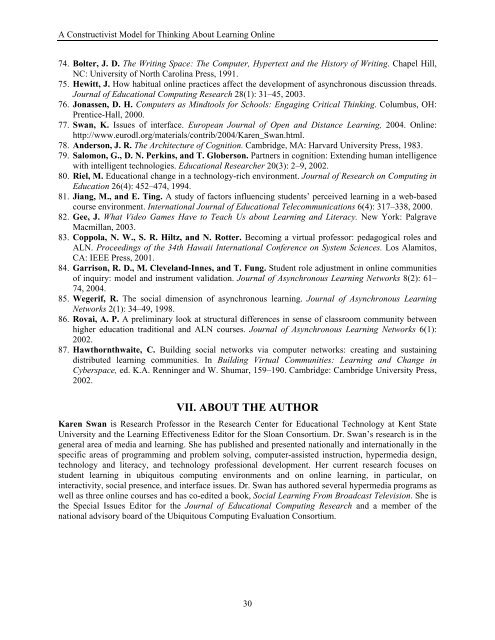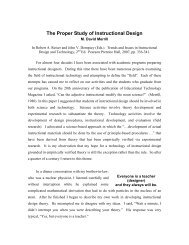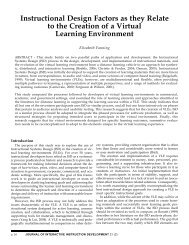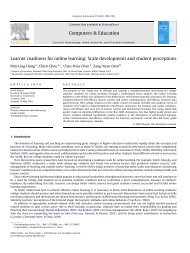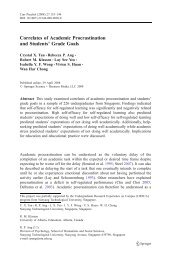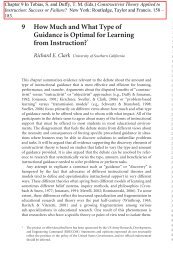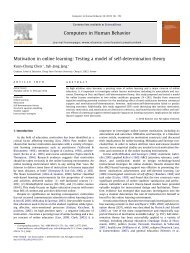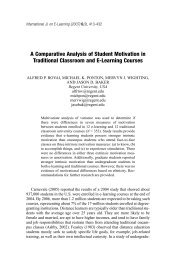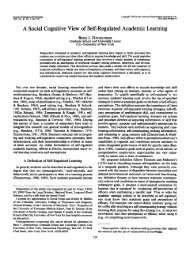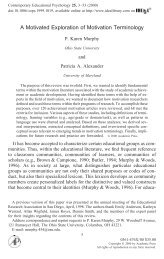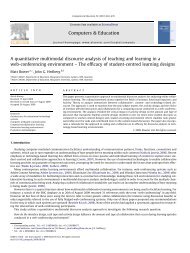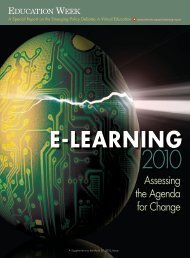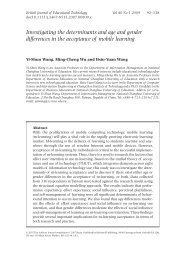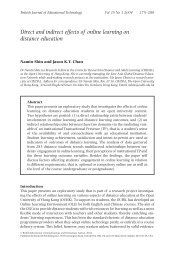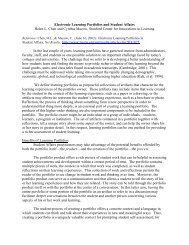Elements of Quality Online Education cation
Elements of Quality Online Education cation
Elements of Quality Online Education cation
Create successful ePaper yourself
Turn your PDF publications into a flip-book with our unique Google optimized e-Paper software.
A Constructivist Model for Thinking About Learning <strong>Online</strong>74. Bolter, J. D. The Writing Space: The Computer, Hypertext and the History <strong>of</strong> Writing. Chapel Hill,NC: University <strong>of</strong> North Carolina Press, 1991.75. Hewitt, J. How habitual online practices affect the development <strong>of</strong> asynchronous discussion threads.Journal <strong>of</strong> <strong>Edu<strong>cation</strong></strong>al Computing Research 28(1): 31–45, 2003.76. Jonassen, D. H. Computers as Mindtools for Schools: Engaging Critical Thinking. Columbus, OH:Prentice-Hall, 2000.77. Swan, K. Issues <strong>of</strong> interface. European Journal <strong>of</strong> Open and Distance Learning, 2004. <strong>Online</strong>:http://www.eurodl.org/materials/contrib/2004/Karen_Swan.html.78. Anderson, J. R. The Architecture <strong>of</strong> Cognition. Cambridge, MA: Harvard University Press, 1983.79. Salomon, G., D. N. Perkins, and T. Globerson. Partners in cognition: Extending human intelligencewith intelligent technologies. <strong>Edu<strong>cation</strong></strong>al Researcher 20(3): 2–9, 2002.80. Riel, M. <strong>Edu<strong>cation</strong></strong>al change in a technology-rich environment. Journal <strong>of</strong> Research on Computing in<strong>Edu<strong>cation</strong></strong> 26(4): 452–474, 1994.81. Jiang, M., and E. Ting. A study <strong>of</strong> factors influencing students’ perceived learning in a web-basedcourse environment. International Journal <strong>of</strong> <strong>Edu<strong>cation</strong></strong>al Telecommuni<strong>cation</strong>s 6(4): 317–338, 2000.82. Gee, J. What Video Games Have to Teach Us about Learning and Literacy. New York: PalgraveMacmillan, 2003.83. Coppola, N. W., S. R. Hiltz, and N. Rotter. Becoming a virtual pr<strong>of</strong>essor: pedagogical roles andALN. Proceedings <strong>of</strong> the 34th Hawaii International Conference on System Sciences. Los Alamitos,CA: IEEE Press, 2001.84. Garrison, R. D., M. Cleveland-Innes, and T. Fung. Student role adjustment in online communities<strong>of</strong> inquiry: model and instrument validation. Journal <strong>of</strong> Asynchronous Learning Networks 8(2): 61–74, 2004.85. Wegerif, R. The social dimension <strong>of</strong> asynchronous learning. Journal <strong>of</strong> Asynchronous LearningNetworks 2(1): 34–49, 1998.86. Rovai, A. P. A preliminary look at structural differences in sense <strong>of</strong> classroom community betweenhigher edu<strong>cation</strong> traditional and ALN courses. Journal <strong>of</strong> Asynchronous Learning Networks 6(1):2002.87. Hawthornthwaite, C. Building social networks via computer networks: creating and sustainingdistributed learning communities. In Building Virtual Communities: Learning and Change inCyberspace, ed. K.A. Renninger and W. Shumar, 159–190. Cambridge: Cambridge University Press,2002.VII. ABOUT THE AUTHORKaren Swan is Research Pr<strong>of</strong>essor in the Research Center for <strong>Edu<strong>cation</strong></strong>al Technology at Kent StateUniversity and the Learning Effectiveness Editor for the Sloan Consortium. Dr. Swan’s research is in thegeneral area <strong>of</strong> media and learning. She has published and presented nationally and internationally in thespecific areas <strong>of</strong> programming and problem solving, computer-assisted instruction, hypermedia design,technology and literacy, and technology pr<strong>of</strong>essional development. Her current research focuses onstudent learning in ubiquitous computing environments and on online learning, in particular, oninteractivity, social presence, and interface issues. Dr. Swan has authored several hypermedia programs aswell as three online courses and has co-edited a book, Social Learning From Broadcast Television. She isthe Special Issues Editor for the Journal <strong>of</strong> <strong>Edu<strong>cation</strong></strong>al Computing Research and a member <strong>of</strong> thenational advisory board <strong>of</strong> the Ubiquitous Computing Evaluation Consortium.30


